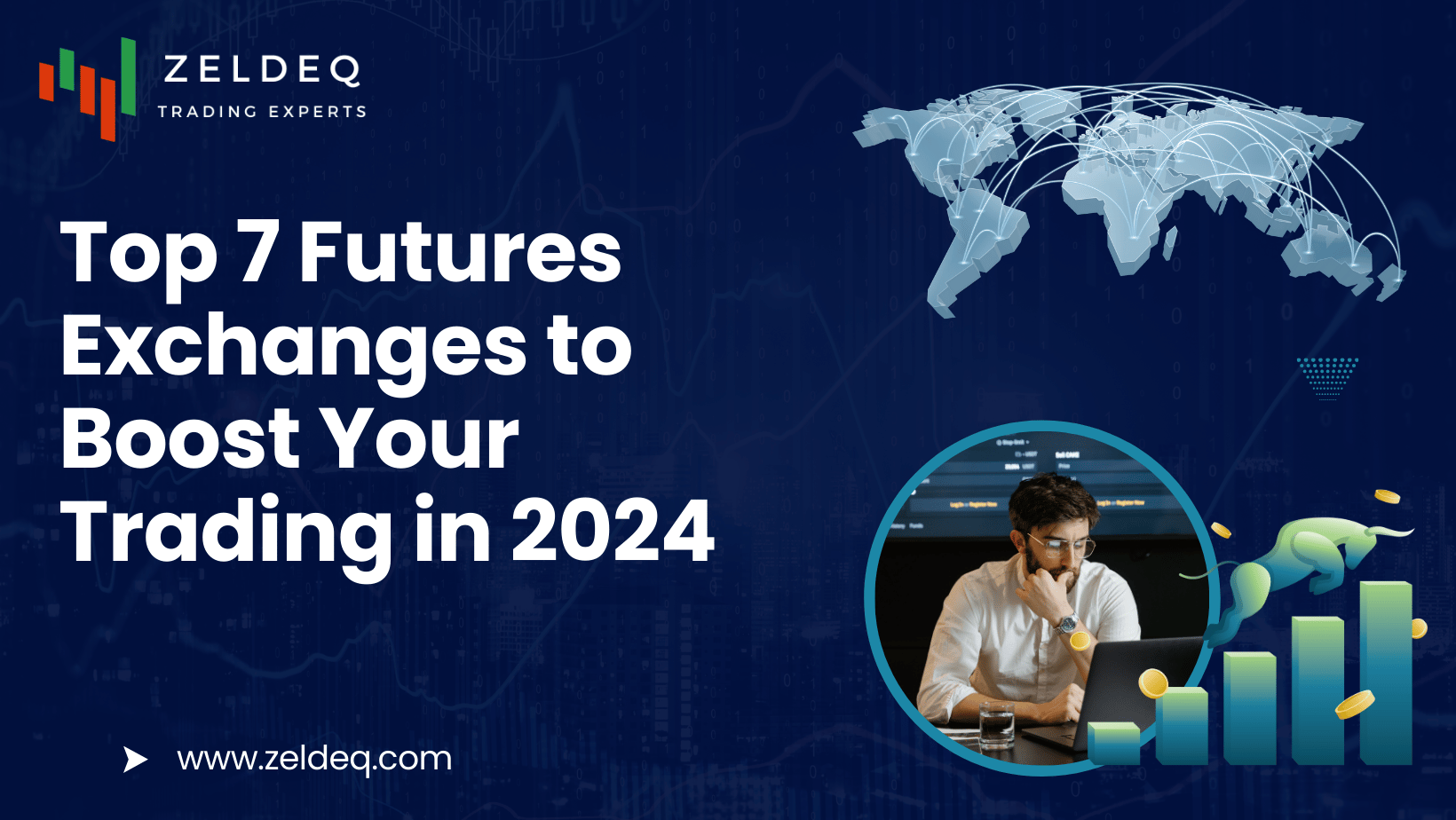Table of Contents
- Introduction to Futures Exchanges
- 1. Chicago Mercantile Exchange (CME)
- 2. Intercontinental Exchange (ICE)
- 3. Eurex Exchange
- 4. London Metal Exchange (LME)
- 5. Tokyo Commodity Exchange (TOCOM)
- 6. National Commodity & Derivatives Exchange (NCDEX)
- 7. Multi Commodity Exchange (MCX)
- Conclusion
- FAQs
Introduction to Futures Exchanges
Futures exchanges are critical platforms in the financial markets that facilitate the trading of futures contracts. These contracts obligate the buyer to purchase, and the seller to sell, a specific asset at a predetermined price at a future date. With the growing interest in futures trading, especially in 2024, understanding where to trade is essential for any trader looking to boost their portfolio. In this article, we’ll take a closer look at the top 7 futures exchanges that can enhance your trading experience.
“Understanding the landscape of futures trading can be the key to unlocking your trading potential.”
1. Chicago Mercantile Exchange (CME)
The Chicago Mercantile Exchange, or CME, is one of the largest and most diverse futures exchanges in the world. Established in 1898, it offers a wide range of products, including agricultural commodities, energy, metals, and financial futures like interest rates, equities, and foreign exchange.
Key Features:
- Diverse Offerings: Over 2,000 products available for trading.
- Advanced Technology: The CME Group employs cutting-edge trading technologies, including high-frequency trading capabilities.
- Global Access: Operates nearly 24 hours a day, providing traders worldwide with access to the markets.
Why Trade at CME?
CME is known for its liquidity and robust market infrastructure, making it an excellent choice for both novice and experienced traders. The platform also offers educational resources to help traders make informed decisions. For more information, visit CME Group.
“CME: Where diverse products meet advanced trading technology.”
2. Intercontinental Exchange (ICE)
Founded in 2000, the Intercontinental Exchange (ICE) is a leading global operator of exchanges and clearinghouses. ICE is well-known for its energy and commodity derivatives, as well as financial products.
Key Features:
- Focus on Energy: Offers extensive products in oil, natural gas, and other energy resources.
- Risk Management: Provides various tools for hedging and managing financial risks.
- Innovative Technology: ICE has invested significantly in technology to improve trading efficiency.
Why Trade at ICE?
ICE is particularly attractive for those trading in energy markets due to its comprehensive offerings. The exchange also provides a user-friendly platform for managing trades and analyzing market trends. Explore more at Intercontinental Exchange.
“ICE: Powering your trades with innovative technology and risk management tools.”
3. Eurex Exchange
Eurex is one of the world’s largest derivatives exchanges, primarily focused on European markets. Founded in 1998, Eurex offers trading in a wide array of products, including equity index derivatives, interest rate derivatives, and more.
Key Features:
- European Focus: Strong presence in European interest rate products and equity index futures.
- High Liquidity: Known for its deep liquidity pools, allowing traders to execute large orders with minimal market impact.
- Advanced Trading Tools: Offers a suite of advanced trading tools for analysis and execution.
Why Trade at Eurex?
Eurex is ideal for traders interested in European financial markets. Its robust trading infrastructure and extensive product offerings make it a go-to for many institutional traders. Learn more about Eurex at Eurex Exchange.
“Eurex: Your gateway to European financial markets.”
4. London Metal Exchange (LME)
The London Metal Exchange (LME), established in 1877, is the world’s premier non-ferrous metals market. It specializes in trading futures and options for metals like copper, aluminum, zinc, and nickel.
Key Features:
- Specialization in Metals: Unmatched liquidity in base metals trading.
- Physical Delivery: Offers the option for physical delivery of metals, which is unique among exchanges.
- Market Transparency: Provides real-time pricing and market data.
Why Trade at LME?
If you are focused on metals trading, LME is the best choice. The exchange’s long-standing reputation and market depth make it a trusted platform for both commercial and investment purposes. For additional details, check out London Metal Exchange.
“LME: The leader in non-ferrous metals trading.”
5. Tokyo Commodity Exchange (TOCOM)
The Tokyo Commodity Exchange (TOCOM) is Japan’s largest commodity futures exchange. Established in 1984, it primarily focuses on energy, precious metals, and agricultural products.
Key Features:
- Focus on Asian Markets: Provides access to Asian commodity markets.
- Innovative Products: Offers unique products like rubber futures, which are less common in Western markets.
- Regulatory Compliance: Operates under strict Japanese regulations, ensuring a secure trading environment.
Why Trade at TOCOM?
TOCOM is an excellent choice for traders looking to tap into the Asian commodity markets. Its innovative products and solid regulatory standing make it a reliable platform. Find out more at TOCOM.
“TOCOM: Bridging traders to Asian commodity opportunities.”
6. National Commodity & Derivatives Exchange (NCDEX)
NCDEX is a leading commodity exchange in India, primarily focusing on agricultural commodities. Established in 2003, it has gained significant traction among Indian traders.
Key Features:
- Agricultural Focus: Offers a range of products tailored to the agricultural sector.
- Innovation in Trading: Provides various trading options, including options on futures.
- Strong Regulatory Framework: Operates under the guidelines of the Securities and Exchange Board of India (SEBI).
Why Trade at NCDEX?
For those interested in Indian agricultural markets, NCDEX provides an unparalleled platform with diverse trading options. Its focus on commodities vital to the Indian economy makes it indispensable for local traders. More information is available at NCDEX.
“NCDEX: The cornerstone of India’s agricultural commodity trading.”
7. Multi Commodity Exchange (MCX)
With its inception in 2003, the Multi Commodity Exchange (MCX) has become the largest commodity exchange in India. It offers a wide range of commodity futures contracts, including metals, energy, and agricultural products.
Key Features:
- Wide Product Range: Offers trading in a variety of commodities tailored for Indian investors.
- Innovative Trading Solutions: Provides a user-friendly online trading platform.
- Strong Market Infrastructure: Efficient settlement and clearing processes.
Why Trade at MCX?
MCX is particularly appealing for traders looking to invest in Indian commodities. Its vast array of products and strong market presence make it an attractive option for both new and experienced traders. Discover more at MCX.
“MCX: Pioneering commodity trading in India.”
Conclusion
Choosing the right futures exchange can significantly impact your trading success. Each of the exchanges mentioned offers unique features and strengths. Whether you’re interested in commodities, metals, or financial futures, there’s a platform that will fit your needs. As you gear up for trading in 2024, consider these exchanges to enhance your trading experience and take your portfolio to the next level.
“The right exchange can be your bridge to trading success. Choose wisely!”
FAQs
1. What are futures exchanges?
Futures exchanges are platforms where traders can buy and sell futures contracts. These contracts obligate the buyer to purchase and the seller to sell a specific asset at a predetermined price at a future date.
2. How do I choose a futures exchange?
When choosing a futures exchange, consider factors such as the types of products offered, trading hours, fees, and the exchange’s reputation for reliability and security.
3. Can I trade futures online?
Yes, most futures exchanges offer online trading platforms, making it easy for traders to access markets from anywhere.
4. What is the importance of liquidity in futures trading?
Liquidity refers to how easily assets can be bought or sold without affecting the asset’s price. High liquidity is crucial for executing trades efficiently and minimizing slippage.
5. Are there risks involved in trading futures?
Yes, trading futures involves significant risks, including market volatility and the potential for substantial losses. It’s essential to understand these risks and have


